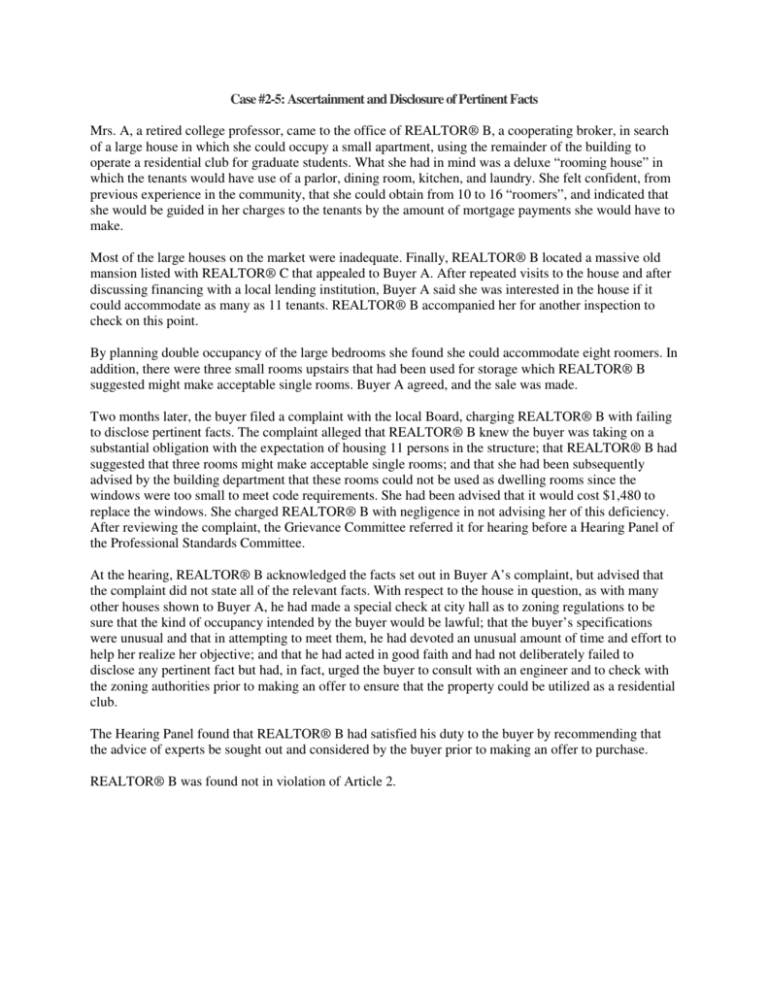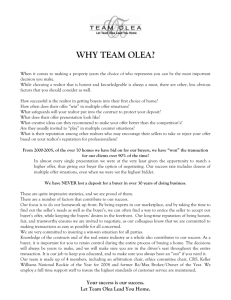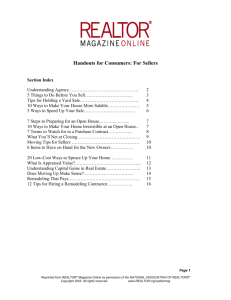Case #2-5: Ascertainment and Disclosure of Pertinent Facts Mrs. A
advertisement

Case #2-5: Ascertainment and Disclosure of Pertinent Facts Mrs. A, a retired college professor, came to the office of REALTOR® B, a cooperating broker, in search of a large house in which she could occupy a small apartment, using the remainder of the building to operate a residential club for graduate students. What she had in mind was a deluxe “rooming house” in which the tenants would have use of a parlor, dining room, kitchen, and laundry. She felt confident, from previous experience in the community, that she could obtain from 10 to 16 “roomers”, and indicated that she would be guided in her charges to the tenants by the amount of mortgage payments she would have to make. Most of the large houses on the market were inadequate. Finally, REALTOR® B located a massive old mansion listed with REALTOR® C that appealed to Buyer A. After repeated visits to the house and after discussing financing with a local lending institution, Buyer A said she was interested in the house if it could accommodate as many as 11 tenants. REALTOR® B accompanied her for another inspection to check on this point. By planning double occupancy of the large bedrooms she found she could accommodate eight roomers. In addition, there were three small rooms upstairs that had been used for storage which REALTOR® B suggested might make acceptable single rooms. Buyer A agreed, and the sale was made. Two months later, the buyer filed a complaint with the local Board, charging REALTOR® B with failing to disclose pertinent facts. The complaint alleged that REALTOR® B knew the buyer was taking on a substantial obligation with the expectation of housing 11 persons in the structure; that REALTOR® B had suggested that three rooms might make acceptable single rooms; and that she had been subsequently advised by the building department that these rooms could not be used as dwelling rooms since the windows were too small to meet code requirements. She had been advised that it would cost $1,480 to replace the windows. She charged REALTOR® B with negligence in not advising her of this deficiency. After reviewing the complaint, the Grievance Committee referred it for hearing before a Hearing Panel of the Professional Standards Committee. At the hearing, REALTOR® B acknowledged the facts set out in Buyer A’s complaint, but advised that the complaint did not state all of the relevant facts. With respect to the house in question, as with many other houses shown to Buyer A, he had made a special check at city hall as to zoning regulations to be sure that the kind of occupancy intended by the buyer would be lawful; that the buyer’s specifications were unusual and that in attempting to meet them, he had devoted an unusual amount of time and effort to help her realize her objective; and that he had acted in good faith and had not deliberately failed to disclose any pertinent fact but had, in fact, urged the buyer to consult with an engineer and to check with the zoning authorities prior to making an offer to ensure that the property could be utilized as a residential club. The Hearing Panel found that REALTOR® B had satisfied his duty to the buyer by recommending that the advice of experts be sought out and considered by the buyer prior to making an offer to purchase. REALTOR® B was found not in violation of Article 2.








